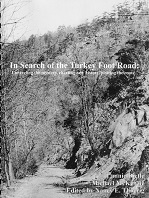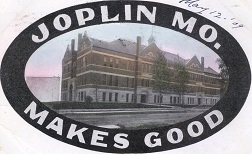
|
Catherine
'Katie' (Younkin) Lichliter |
|
Close-up of Levi's grave marker |
Catherine "Katie" (Younkin) Lichliter was born on July 22, 1819 near Kingwood, Somerset County, PA, the daughter of John J. and Mary "Polly" (Hartzell) Younkin.
She wed Rev. Levi Lichliter (1814-1862), one of 13 children of Jacob and Jemima (Campbell) Leichliter, and grandson of German immigrant Levi Lichliter. (Their surname has been spelled both ways.) He was the founder of what today is the Wesley Chapel United Methodist Church in Scullton, Somerset County.
The four children they bore together were Norman Bruce Lichliter, Rev. Marcellus Deaves Lichliter, Milton Campbell Lichliter and Sarah Lichliter. They also suffered the deaths of two infants, and the fate of daughter Sarah is unknown.
The 1913 book Encyclopedia of Pennsylvania Biography, Illustrated, Volume III, by John W. Jordan, says that Catherine's ancestors in Europe had "supported Cromwell, [and] were obligated to flee to this country to escape religious persecution, and found a home among the hills of New England." It also reported that Levi's Campbell forbears served at the Battle of the Boyne in the 1600s in Ireland, helping to preserve the Protestant faith in that country before Jacob Conrad Lechleiter of Bremen, Germany emigrating to America in the 1740s.
|
|
|
Levi's grave, 1862 |
Katie is not to be confused with her cousin Susan Younkin, who married Levi's brother John Campbell Lichliter. In other examples of the intertwined Lichliter Younkin-Minerd connections, Levi's half sister, Margaret J. Lichliter, married Joel Minerd, son of Jacob and Catherine (Younkin) Minerd Jr.; Levi's niece Amanda wed Martin Miner; and Levi's brother John Campbell Lichliter wed Susan Younkin, daughter of Henry Younkin. (See a manuscript list of some of these inter-married families handwritten by the late Agnes [Miner] Miller.)
The family dwelled on a farm of 111 acres, and were active in the local informal congregation of Methodist worshippers. When the group organized into what today is the Wesley Chapel United Methodist Church at Scullton, Levi donated money generously.
During the final year of his life, as Levi's health declined, an administrator was appointed by the Orphan's Court of Somerset County to manage his estate.
Levi died on July 13, 1862 (or 1863) at the age of 48. He was laid to rest in the churchyard of what became Wesley Chapel near Scullton, Somerset County. An upright grave marker was placed on his grave. The following epitaph was inscribed, from the 1861 James Montgomery poem, To the Spirit of a Departed Friend: "Thou are not dead, Thou couldst not die; To nobler life new-born."
Historical
booklet
The marker remains erect and legible today, and is the only grave in the well-manicured burying ground to be aligned at a 45-degree angle to the rest of the parallel rows of plots.

Catherine survived him by nine years. The year after Levi's death, on Nov. 9, 1863, she transferred a one-half acre of property from their home farm to be used for construction of the first Wesley Chapel building. Until that time, only circuit riders had conducted occasional services in the area. Their 19-year-old son Norman was named a trustee of the church. Among the other trustees at the time were Messmore Cramer, Joseph B. Critchfield, David Lichliter, John Lanning, John C. Phillippi and Jeremiah Pile. During the spring of 1876, their son Marcellus served as pastor. Eventually a frame building was constructed, measuring 36 feet in width by 48 feet in height, with three windows on each side and two doors facing the road.
She died on April 16, 1871, at age 51. She is buried in the Ursina Cemetery. Read letters written by one of the Lichliter nieces, of Salisbury, Somerset County, dated Sept. 6, 1935, Sept. 1, 1936 and March 27, 1939.
The Lichliter family also is profiled in depth in the 1906 book History of Bedford and Somerset Counties, Pennsylvania, Volume III, by E. Howard Blackburn, William Henry Welfley and William H. Koontz, and in the 1936 book Annals of Southwestern Pennsylvania, by Lewis B. Walkinshaw. They also were profiled in a series of articles in the Mountaineer newspaper of Normalville, Fayette County, published in September 1899 by George W. Campbell. More about the chapel is contained in the 1993 booklet Wesley Chapel United Methodist Church.
|
|
| Above: Wesley Chapel (circled in orange) near Metzler's Mill (green), from the 1876 Atlas of Somerset County. Below: Wesley Chapel today, rebuilt 1974 |
|
|
~ Son Norman Bruce Lichliter ~
Son Norman Bruce Lichliter (1844?-1930) was born in about 1844.
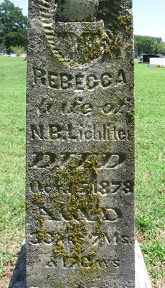
When he was age 19, his father died, leaving a parcel of land to the local Wesley Chapel Methodist church. Norman eventually was named a trustee of the congregation.
He married Rebecca King (Feb. 28, 1845-1878), daughter of Samuel K. and Christianna King.
They produced a family including offspring Ida McFarland, Cora Felicia Miller, Charles Kingsley Lichliter, Levi Leroy Lichliter, Sadie Calista Coltrane and Oscar Emerson Lichliter.
Norman was a charter member of the Ursina Lodge of the International Order of Odd Fellows (IOOF), formed July 12, 1873, and served as secretary of the organization. On Feb. 12, 1873, the Somerset Herald's Ursina Items column reported that he had "purchased the Jennings farm near this place."
According to the 1884 book History of Bedford, Somerset and Fulton Counties, Pennsylvania, he was the first shoemaker in Ursina and in 1871 built a stave factory there. "The building has recently been converted into a keg factory," said the History, "owned by the Citizens' Oil Refining Company, and operated by Edward Alcott." The Meyersdale New Republican in 1954 repeated the story of Norman's stave factory converted into a keg or barrel operation.
The Lichliters migrated west in the mid-1870s when their son Levi was just a boy. Norman's brother Milton appears to have joined them on this relocation.
|
|
|
Above: Norman's farm (circled) between Confluence and Ursina. Below: his tracts in Ursina Borough, facing Weyand Avenue and North Fork Creek, 1876 |
|
|
|
2014 book naming Norman |
Sadness blanketed the family when, at the age of 33, Rebecca died in Kansas on Oct. 15, 1878. Her remains were lowered under the sod of Fredonia City Cemetery in Wilson County, KS. A large upright obelisk marks her grave today.
The widowed Norman remained in Joplin and in 1880 managed a mercantile store with William H. Fallis, owned by Samuel C. Cupples & Co. The partners made news in the St. Louis Post-Dispatch in September 1881 when arrested on charges of fraud, a matter in which he had involved his younger brother Milton. He installed his brother as a phantom owner of the business and then went out into the marketplace to secure a host of loans. Using the funds, he and Fallis purchased goods and sold them at high markups without reporting any of the income and profits to the store's owner.
Reported the St. Louis Post-Dispatch:
One of the most ingenious swindling schemes lately attempted in Missouri has just been fully exploited by Mr. John N. Glover, the attorney for Messrs. Samuel C. Cupples & Co. The large wholesale houses of the city are regarded as legitimate prey by the sharps through the country, and over and over again some new game is developed by which the merchant gains in experience what he loses in money. Messrs. Fallis & Lichliter, of Joplin, Mo., were the heroes of the following story, which goes to show that the adage about the best laid schemes of mice and men holds in Jasper county as well as in Scotland. These two gentlemen investigated the credit system as practiced by wholesale merchants generally, and found a weak point in it. Their names are Norman B. Lechliter [sic] and W.H. Fallis, and they caused two people, a woman named E.A. Fallis and a boy named M.C. Lichliter to sign articles of partnership under the firm name of Fallis & Lichliter. Then these parties began business at the store and nobody for a moment supposed that they were not the Fallis & Lichliter whose names were hung out upon the sign.
Lichliter and Fallis both have property in Jasper county, and the firm was given a fair commercial rating. It was credited with over $10,000 capital, and indeed Lichliter told Mr. Cupples upon one occasion that he was worth $10,000 more than was the fact. They got credit right and left in St. Louis, catching all the heavier firms for sums ranging from $1,000 to $4,000 and running up accounts that aggregate over $20,000. As they got these goods for nothing they had little difficulty in doing a smashing business, and what they could not sell in Joplin they shipped on to Kansas and peddled about until they had completely got it out of sight. Then came the next move into the game. Fallis and Lichliter went into bankruptcy; liabilities twenty odd thousand dollars, assets six hundred and odd dollars. Of course everybody was surprised, and when the attaches went to attaching there was still another surprise for them in the fact that Norman B. Lichliter and W.H. Farris were not the debtors, but that a woman and a boy were, both of whom were execution proof from the nature of the law. Mr. John M. Glover went to work upon the case and soon exhumed testimony enough to break down the flimsy blind which had been erected by the swindlers. Mr. Cupples' claim was $2,000, and fortunately Mr. Glover discovered real estate enough belonging to the parties to more than cover the claim which he at once attached. Having secured the loss he went to work to punish the offenders, and a very pretty piece of work was done. The mother [matter?] was presented to the St. Louis grand jury at 10 o'clock, yesterday. Evidence was produced proving conclusively collusion and fraud... Chief Kennett at once telegraphed Sheriff Cass Hamilton of Jasper County and at 1 o'clock both of the men were in custody.
Norman in his defense said that Fallis had been in control of the scam and that he himself was nothing more than a traveling salesman. A story in the Globe-Democrat the next day said that the pair "stood high in this community, Lichliter being one of the strong pillars in the M.E. Church, possessing a deep bass voice which was heard in the choir on regular days of worship." The case went to trial in St. Louis criminal court in December 1881. Another trial was held in May 1882 on charges of perjury. The Criminal Court jury handed down a ruling of "guilty" with Norman and Fallis sentenced to two years in the penitentiary.
Norman made bail in November 1882 with Joplin resident Thomas Connor putting up the funds. Reported the Joplin Herald, "Mr. Lichliter was almost a stranger to [Connor], but learning that Lichliter was a poor man and had a helpless family of five children here in Joplin, their mother being dead, Mr. Connor's heart was touched and he manifested his feelings in a substantial way. No greater kindness could be done a man than was done for Mr. Lichliter in this instance. He was a stranger in jail in a strange city, separated from friends and family. We do not know whether Mr. Connor is a church member, but any way he is entitled to the esteem of every humane person for this one act."
His case was appealed in the St. Louis Criminal Court, with a restitution motion filed on Norman's behalf. His release and exoneration appear to have been granted in June 1888, with nothing more appearing in local newspapers on the subject.
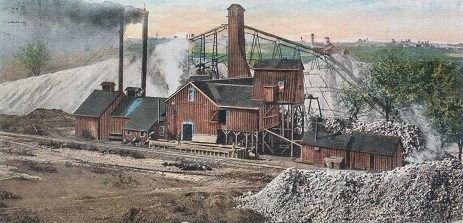 |
| Dirty zinc and lead mines in Joplin, MO |
Circa 1892, Norman operated some "heavy producing" zinc mines at Carterville, MO, on property owned by "Chatham." He was badly injured by a falling pulley at the mine on May 7, 1892. Reported the Herald, "Mr. Lichliter was standing on the landing board while the hoister man was hoisting a miner from the ground. When the man had been hoisted about twenty feet from the bottom the pulley broke loose from the top of the derrick and fell, striking Mr. Lichliter on the forehead, inflicting a deep wound. The blow threw him backwards heavily to the ground and his head striking some rocks he received two severe scalp wounds."
He recovered and in February 1893 is known to have sold 104,680 lbs. of zinc (known as "jack") from his Chatham mine. "It was the output of one week," said the Joplin Weekly Herald, "the miners working only one shift per day."
He later made his way to Prescott, AZ. There, on Aug. 5, 1902, he again was married to Jennie E. Griswold ( ? - ? ), daughter of Maria C. Griswold. News of the happy event was printed in the Clay Center (KS) Dispatch and the Joplin Globe, which said he was "the well known real estate man and [she] was formerly a teacher in the Joplin schools" at Garfield. Their first home was in Joplin, at 124 North Pearl Street.
In all, Norman resided in Joplin for 39 years. Then in 1918, he and Jennie moved to Southern California, where they spent the last dozen years of their married lives together. There, he bought and sold two town lots in Huntington Beach. He also built a new home in 1922 at 650 North Chester Avenue. Circa 1929, he returned to Joplin for a visit.
He was stricken by a heart attack and died in Pasadena Hospital at the age of 88 on April 11, 1930. The Pasadena Post said that "Besides his widow, he is survived by five children, all of whom reside in or near Joplin, Mo." The Joplin Globe said he was a "former pioneer resident of Joplin and widely known in this district..." A brief obituary in the Joplin News-Herald said that the body was to be shipped to Joplin for interment. But in fact burial took place in Mountain View Cemetery in Altadena near Los Angeles.
Jennie outlived her husband by a number of years. She was active in the local Community Chest campaign in Pasadena. Her final fate is not yet known.
In 2014, the language about Norman from the 1884 History book was reprinted in the fourth edition of In Search of the Turkey Foot Road — Unraveling the Mystery, Charting New History, Plotting the Route, co-authored by Lannie Dietle and Michael McKenzie, edited by Nancy E. Thoerig and published by the Mount Savage Historical Society in Maryland. [See page 446.]
See more about this family in a letter from Edith Susan Lichliter (of Salisbury, PA) to Otto Roosevelt Younkin, president of the Younkin National Home-Coming Reunion, dated March 27, 1939.
Daughter Ida Lichliter (1866-1951) was born on July 23, 1866. She relocated with her parents and family to Missouri in her youth. Ida wed Dr. Edgar W. McFarland (Sept. 7, 1860-1949). Edgar was a longtime dentist. They are known to have dwelled in Webb City, MO in 1920. On May 8, 1949, he succumbed to the spectre of death at the age of 88. Sadly, at the age of 85, Ida died in Webb City, MO on Dec. 14, 1951. Burial was in Mount Hope Cemetery in town.
|
Son Charles Kingsley Lichliter (1869-1875)
Son Levi Leroy Lichliter (1872-1953) was born on Oct. 25, 1872 in Confluence, Somerset County. After migrating as a youngster to Missouri, in about 1880, he grew to adulthood. He was a longtime salesman of educational publications for Ginn & Co.. He wedded Valeria S. Lee ( ? - ? ) and the couple made their home at 3721 Holmes Street in Kansas City, Jackson County, MO. They had at least four children: Leroy L. Lichliter Jr., Mary Elizabeth Lichliter, Katharine Valeria Lichliter and Richard Norman Lichliter, who tragically died at age two of peritonitis. The Lichliters dwelled in Kansas City in 1930 and in St. Louis, MO in the mid-1940s. When he was 75 years of age, in August 1946, Levi and son Levi Jr. traveled to their old home of Ursina, Somerset County, and were overnight guests of their cousins, Edith Susan and Almira Lichliter, daughters of Levi and Sarah A. (Smith) Lichliter of the family of John Campbell and Susan (Younkin) Lichliter. In reporting on the reunion, the Meyersdale (PA) Republican said that Levi had moved to Missouri at the age of eight and "had not been back since that time. Mr. Lichliter's father, Norman B. Lichliter, was a first cousin of the late Levi Lichliter. Accompanied by J.C. Lichliter, Sr., and Edith, they visited Mr. Lichliter's birthplace, the present home of Calvin Groff, Sr., near Confluence, where they were royally received and fully informed." Levi became ill with cancer of the colon, and died at age 80 on May 10, 1953. Interment was in Mt. Moriah Cemetery in Kansas City.
-
Grandson Leroy L. Lichliter Jr. worked for the government. In August 1946, he and his father traveled cross-country to see the father's birthplace and visit with relatives in Ursina, Somerset County.
Daughter Sadie Calista Lichliter (1873-1963) was born in 1873. She married V.O. Coltrane ( ? - ? ). Their home in 1927-1930 was in Springfield, MO.
Son Oscar Emerson Lichliter (1875-1967) was born on Dec. 19, 1875 in Joplin, MO. He spent nearly all of his life in the town of his birth. As an adult he moved to Springfield for employment as secretary of Drury College but was there only for a few years before a return to Joplin. In 1914, in Wichita, KS, at the age of 38, he entered into marriage with Nelle Smith (1884-1963), daughter of William Young and Annabelle (Campbell) Smith of Springfield. The pair did not reproduce. Oscar ventured into real estate, purchasing the Lichliter Building on Main Street and in 1946 acquiring the Lichliter Apartments at the corner of Pearl Avenue and First Street. Their address in 1930 was at 403 West First Street and later at 106 North Pearl Avenue. He held memberships in the local First Methodist Church and lodge of the Masons. In her own right, Nelle served as secretary for several years of the YWCA. She passed away at the age of 78 on June 1, 1963. With his health failing, he moved into a local nursing home in January 1967. There, he died at the age of 91 on Feb. 3, 1967. An obituary said he was "survived by several nieces and nephews." Burial was in Mount Hope Cemetery in nearby Webb City.
~ Son Rev. Marcellus Deaves Lichliter ~
Son Rev. Marcellus Deaves Lichliter (1849-1917) was born on April 10, 1849 on a farm near New Lexington, Somerset County.
He later recalled that "I glory in my kinship. My father, on one side, was a German, my father upon the other was an Englishman. My mother, on the one side, was a Yankee, and on the other side an Irish woman." In describing his growing-up years, he once said that "When I was a boy I thought the more beef I ate and the more cabbage and potatoes I crammed down in my little stomach the sooner I would be a man."
He married Mary Florence McIlyar ( ? - ? ), daughter of Rev. James Jackson and Alice (Morris) McIlyar of Butler, Butler County, PA. The wedding took place in Butler on June 22, 1876, when Marcellus was age 27.
They had two children -- McIlyar Hamilton Lichliter and Alice Morris Crooks.
Marcellus' relatives knew him as a "famous minister," but he also was an educator, author and lecturer, "descended from good ancestral stock -- German, English and Scotch-Irish -- grafted into New England Puritan stock," said his entry in the 1913 book, Encyclopedia of Pennsylvania Biography, Illustrated, Volume III, authored by John W. Jordan. He obtained secondary education at Mount Union College in Ohio and then taught school for several years. Yearning to pursue a career in Christian ministry as had his father, Marcellus began his preaching career in 1872 as part of the Pittsburgh Annual Conference, and remained in this role for 28 years. During that time, he was "statistician" for a decade until poor health forced him to step down.
|
|
| Above: Rev. Marcellus D. Lichliter was among Pittsburghers viewing the wreckage wrought by the 1877 railroad strike, Harper's Weekly, Aug. 11, 1877. Below: violence during the bloody Homestead steel strike, Harper's Weekly, July 16, 1892 |
|
|
He was an eyewitness to the aftermath of two tragic, violent events which shaped Pittsburgh's labor history -- the 1877 railroad strike which causes millions in damages, and the 1889 Homestead steelworker strike resulting in the deaths of both strikers and Pinkerton detectives.
|
Their home in 1880 was on 41st Street in Pittsburgh, with the census-taker spelling their name "Leithleiter." That year, Marcellus served as pastor of the 33rd Street Church, and 21-year-old Kate Cunningham lived in their dwelling as a servant.
At some point in the 1890s, Marcellus served briefly as the minister of the Hopwood United Methodist Church, and "looked after the spiritual welfare of the members..." Among the other earlier pastors of the congregation was Rev. Isaac Herschel Minerd, a cousin on the Younkin side of the family. Both men are mentioned in a history of the congregation published in the April 1908 edition of the Hopwood Chronicle.
Later, Governor William S. Stone appointed him as chief clerk of the Pennsylvania Department of Agriculture, and he resided in Harrisburg, Dauphin County, PA. He was a member of the Independent Order of Good Templars, the Odd Fellows and the Masons.
Circa 1911-1912, he served as chaplain of the National Council of the Junior Order of United American Mechanics. The JOUAM was a pro-labor, anti-Catholic organization which campaigned against the hiring of cheap immigrant workers and patronized only American businesses. He is known to have served on a three-member committee with chairman W.L.S. Gilchreast and J.H. Hambrick, to author the organization's secretive, "Short Form Ritual" governing membership and procedures. This 56-page, soft-cover booklet, with an original preserved today in the Minerd.com Archives, was authorized by the National Council in session at Tiffin, OH on June 22, 1911. Its introduction reads as follows:
Sons of a common country, reared under the same flag and influenced by like tradition, we have come here that we may trim and brighten the sacred fires of fraternity and patriotism. Withdrawn from the tumult, selfishness and striving of every-day life; safe from the inquisitive, the envious and the faultfinding, we find ourselves in a presence where we may deliberate and resolve with that perfect freedom possible only when men come together intent upon high purposes and where a true regard for the opinion of others ever moves to speech and action. With a just pride in our country’s past and a sublime faith in its future, let us so carry ourselves here as to fill full the measure of our own approval, and so demean ourselves abroad as to bear witness that we hold our citizenship a precious birthright and our exercise of it a privilege beyond price.
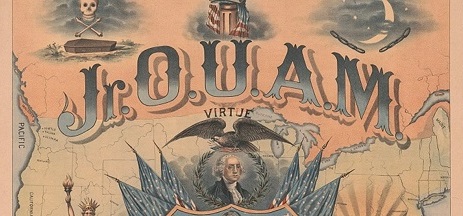 |
| Junior Order of United American Mechanics logo |
As a representative of the JOUAM, at least twice, he gave testimony to the House Committee on Immigration and Naturalization, based on his strong dislike of unskilled immigrant laborers who were taking jobs away from Americans.
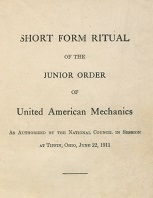
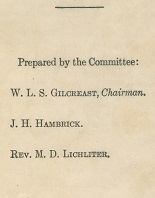
At one hearing, he claimed the United States could not properly assimilate the vast waves of newcomers and urged Congress to restrict immigration. In one instance he went so far as to say the "moral fiber of the nation has been weakened and its very life-blood vitiated by the influx of this tide of oriental scum." His other work as a lecturer was "in great demand," said the Encyclopedia, "and he has been called into many States to address public meetings and to present flags and Bibles. Since his connection with the organization he has presented to the public schools fifty Bibles and more than four hundred flags."
He also was a prolific author and was a correspondent for The American journal for 30 years. Among his printed works were "historical monographs" about early Americana covering mound builders, General Henry Bouquet, Fort Necessity, Captain Sam Brady and many more. He gave several talks over the years at the Historical Society of Western Pennsylvania, one on Feb. 13, 1890 on "General John Gibson." On June 27, 1916, residing in the Bellevue section of Pittsburgh, he gave another speech at the Historical Society entitled "Woman and Her Relation to American History."
Burdened at the end of his life with chronic kidney problems, Marcellus died in Harrisburg's Keystone Hospital on Dec. 20, 1917. Interment was in Harrisburg Cemetery. [See the Encyclopedia profile]
|
|
|
Rev. McIlyar Lichliter, left, with fellow Masons officials at a vesper service for the Supreme Council, 33rd Degree Ancient Accepted Scottish Rite, Northern Masonic Jurisdiction at Emmanuel Church in Boston, Sept. 1951. Others, L-R: Rev. Robert G. Metters, Rev. Lauriston L. Scaife and Dr. Melvin M. Johnson |
|
McIlyar Lichliter |
Son Rev. McIlyar Hamilton Lichliter (1877-1961) was born in 1877 in Butler, Butler County, PA and was a third generation Christian clergyman. He married Gertrude Larimore ( ? - ? ), daughter of Dr. and Mrs. J.M. Larimore of Greenfield, IN. The ceremony was led by McIlyar's father. In announcing the happy event, a newspaper said that the couple "are well known in college circles, both having been graduated from dePauw university with the class of 1900... The bride had charge of the English department in the Greenfield High School last year and was a popular and successful teacher. The groom was assistant state secretary Y.M.C.A. headquarters at Indianapolis, in 1900, and is now pastor of the M.E. Church, South Fork, Pa." Their two children were Mary Florence Lichliter and Rev. James Marcellus Lichliter. McIlyar attended Duquesne College, Ohio Wesleyan University and DePauw University, receiving a bachelor of arts from DePauw in 1900. He then obtained a master's degree from DePauw in 1903. Pursuing the ministry, he began his career as a Methodist Episcopal Church minister in Pennsylvania, in Pitcairn (1900-1901), South Fork (1901-1903) and Verona (1903-1905) before transferring to Genesee, NY (1905), St. Louis (1908) and Baltimore (1913, Grace Methodist Episcopal Church).
He withdrew from the Methodist denomination and joined the Congregational Church in 1919. He was a prolific writer and may have been in Boston in 1924, when his name appears as a co-author of Grant Night Dinner involving the Middlesex Club. In 1936, Harper & Brothers published his book of sermons, entitled A Pillow of Stones. His photograph portrait appeared on the blue dust jacket, with promotional text reading: "Called in 1924 to the pastorate of the First Congregational Parish of Columbus, Ohio -- whose pulpit is to be associated forever in the religious mind of America with the name of Washington Gladden -- Dr. Lichliter has added greatly to the glories of a famous church. He had already behind him a ministry of notable service, having successfully filled charges in St. Louis, Cleveland, Baltimore and Newton, Massachusetts, in both Methodist Episcopal and Congregational denominations. In these sermons Dr. Lichliter addresses himself to the problems of 'life's difficult hours'." McIlyar gave a sermon before the Congregational Church's General Council at Berkeley, CA on Aug. 18, 1940, as the World War II storm clouds were forming in Europe, and it was reprinted as an article headlined "Invincible Freedom" in the November 1940 edition of Congregational Vermont. In the piece, he wrote:
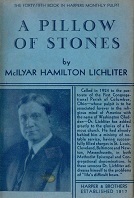
I do not share the fears of many that the Nazi tyranny can achieve much on this continent, except, perhaps, in the field of economic warfare. Nor do I fear that the British Empire will yield no matter what may happen in the British Isles, But, let us assume that Hitler's dream of world domination comes true, what then? Even so, I know of no disaster which can ever destroy the liberty of the Christian man.
McIlyar's
article,
He went on to pastor the First Congregational Church in Columbus, OH until retirement in 1942. From there they moved to Boston, where he joined the staff of the Supreme Council of the Scottish Rite. Their final years were spent together in Akron, OH, where their son James was serving as pastor of St. Paul's Episcopal Church.

"Invincible Freedom"
Gertrude died on Aug. 14, 1960. An obituary in the Hancock Democrat in her hometown of Greenfield said that "She served with her husband in various ministries of the Methodist and Congregational churches in Pennsylvania, New York, Massachusetts and Ohio. While in Newtonville, Mass., Mrs. Lichliter founded the Boston Inter-Collegiate Alumna chapter of Kappa Kappa Gamma, which included Kappas from throughout the country. Mrs. Lichliter's activities encompassed a wide range of interests, and was prominent in many women's church and civic organizations." Rev. William Leath presided over the funeral. McIlyar only lived for another five months. He too passed in Akron on Jan. 16, 1961. Burial was in Park Cemetery in Greenfield, with Rev. William Meddock leading the obsequies. A memorial service was conducted in his former church in Columbus.
Opined an obituary in The Philalethes, a newsletter of the Masonic order, "It is difficult to say whether his vocation was that of a minister, of an editor, of a ritualist, of a teacher, or probably, a happy and vigorous combination of all of them, which translated itself into the vocation of public servant."
-
Granddaughter Mary Florence Lichliter (1905-2001) was born in 1905. She is not known to have married but devoted her life to her career. She was employed in 1947 as director of personal counseling at Boston University. From 1948 to 1968, she was in St. Charles, MO, serving as director of guidance and dean of women at Lindenwood College. She was promoted to dean of continuing education and career planning in 1968 and then to director of alumnae affairs and placement in 1974. She retired in 1976. A dozen years later, in May 1988, the college awarded her an honorary doctorate of human letters. She retired to Pompano Beach, FL, where she lived to the end. She died at the age of 95 on Jan. 23, 2001. Her remains were transported to her mother's hometown to sleep for the ages in Park Cemetery.
- Grandson Rev. James Marcellus Lichliter (1911-1999) was born on April 28, 1911 in St. Louis. He and was a fourth generation Christian clergyman, named in part for his paternal grandfather. James married Mary Jane Evans (1914- ? ). They had at least two children, Mary Christie Lichliter and Bruce Evans Lichliter, both born in St. Louis. Rev. James was named pastor of St. Paul's Episcopal Church of Akron, Ohio circa 1936 and in the mid-1940s was rector of Emmanuel Episcopal Church in Webster Groves, MO and later as canon for Christ Church Cathedral in St. Louis. In 1961, he was named to the pulpit of First Congregational Church of Battle Creek, MI. He authored at least three books -- Tennyson's Response to the Victorian Religious Dilemma (1933), Whose Leaf Shall Not Wither (1956) and Inside the Outside (1968). In 1961, he wed again to Marilyn Markle (1922-2015). James died in Battle Creek, MI on Aug. 21, 1999, at the age of 88.
Daughter Alice Morris Lichliter (1879- ? ) was born in 1879 most likely in Pittsburgh. She married A. Bradford Crooks ( ? - ? ). Bradford was a merchant from Boise, Idaho. She received her higher education at the Pennsylvania College of Music and performed at the Chautauqua Institution. More will be added here when learned.
~ Son
Milton Campbell Lichliter ~Son Milton Campbell Lichliter (1858-1927) was born on Oct. 4, 1858 in Somerset County, PA.
As a teenager, Milton migrated with his older brother Norman to Fredonia, KS, where they ran a mercantile store. Then by 1875 they moved to Joplin, MO. There, he was employed in a store owned by Samuel B. Cupples and operated by his brother in partnership with William H. Fallis, hanging out their shingle as "Fallis & Lichliter."
The unwitting young Milton was drawn into a fraudulent scheme his brother and partner drew up, reported the St. Louis Post-Dispatch, inducing Milton and Fallis' wife "to sign articles of partnership under the firm name of Fallis & Lichliter," which they did not truthfully own. "Then these parties began business at the store and nobody for a moment supposed that they were not the Fallis & Lichliter whose names were hung out upon the sign as a grocer." The partners then obtained lines of credit from a number of banks in the midwest, purchased stock and sold it for their own benefit, without having to remit anything to the store, owned by Samuel C. Cupples & Co. The scheme was found out and the brother and partner arrested, making news in St. Louis and throughout Missouri. Milton's name was mentioned at times as a participant, referred to as "a boy," but he was never charged. The brother served several years in a penitentiary before being exonerated and released.
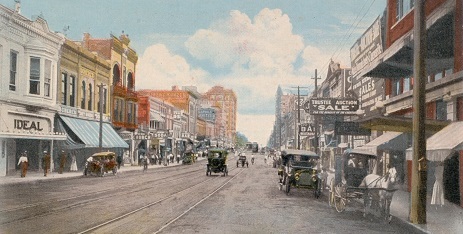
North Main Street in early Joplin, MO 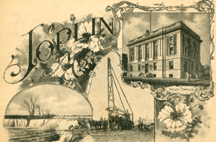
Joplin, early 1900s
On June 3, 1884, when he was age 26, Milton married 20-year-old Missourian Emma Gillette (1864-1926), daughter of Lewis E. and Elizabeth Gillette. The Joplin Herald announced the marriage, saying it was held in the residence of the bride's mother, "in time for the bride and groom to take the Gulf train for a short wedding trip."
They did not reproduce.
Milton and his brother-in-law Jay Gillette went into business for themselves, together managing a grocery in East Joplin. Said a newspaper, "The grocery store was operated under the firm name of Lichliter and Gillette until the brother-in-law died and Mr. Lichliter continued in the business alone."
Emma learned the art of sewing and quilt-making and was active in the mid-1880s in the sewing society of the local Christian church. In November 1887, a local newspaper said she knew how to "make a very handsome crazy quilt."
Milton also earned a living in 1891 as superintendent and manager of the Knoble Mining Company. His grocery in 1896 was located on Broadway in East Joplin. In November that year, thieves broke in by smashing the front door glass and making off with two sacks of flour, two sides of back and coffee, sugar and tobacco. He was issued a warrant by Justice McAdams in July 1902 for selling goods on a Sunday, with the Retail Clerks Protective Association responsible for turning him in.
Tidbits of their lives are known through the gossip columns of the Joplin newspapers of the era. Milton and his brother Norman hosted a visit in May 1903 from their brother Marcellus, who had traveled from his home in Harrisburg, PA. At about that time, Emma served as treasurer of the Carnegie Library board on the corner of Nine and Wall Streets in Joplin. Milton on a blazing hot day in August 1907 made news when one of the eggs he had for sale in the store hatched into a live chick, and he took it home for Emma to raise. Just before Christmas 1908, during a visit to the Sterling Lead and Zinc Company mine, Milton was "badly cut on the head by a falling rock" in a shaft at the site. Milton and his business partner were arrested the week of Christmas 1910, for allegedly renting out a building for use as a "bawdy house." They pleaded guilty the first week of January 1911 for "leasing property for immoral purposes" and each was fined $25.
The federal census of 1910 shows Milton and Emma living on East Fourth Street in Joplin with a 32-year-old lodger, John L. Thornton, in the dwelling.
Circa 1920, the couple resided in Los Angeles, Los Angeles County, CA, on Figueroa Street. Neither held an occupation that year, according to the federal census. At the death of Emma's brother Jay Gillette, in February 1920, they traveled to attend the funeral.
They relocated back to Joplin at some point in the early 1920s and made their home was at 313 East 4th Street.
Emma contracted a cancerous sigmoid and underwent surgery in St. John's Hospital in mid-September 1926. But nothing could be done. Within a few days she died at age 62 on Sept. 19, 1926. An obituary in the Carthage Evening Press said that funeral services would be conducted in the Lichliter residence. It added that "Mrs. Lichliter often visited in Carthage and had numerous friends here. The family long had resided in Joplin. Mr. Lichliter for many years was a merchant in East Joplin."
Suffering from diabetes, Milton only lived for another six months. He died in Joplin at the age of 68 on March 29, 1927. His obituary was published in the Joplin Globe, saying he "had been in ill health since December but his condition did not become serious until Saturday." The obituary named his surviving nephews Oscar and Levi, and nieces Cora Miller, Ida McFarland and Sadie Coltrane. Funeral rites were conducted by Rev. J.H. Stidham of the First Christian Church. He was interred in Mt. Hope Cemetery.
Copyright © 2013-2017
Thank you to the cousin-researchers who graciously shared their findings for this biography: the late Donna (Younkin) Logan and the late Olive (Rowan) Duff.






